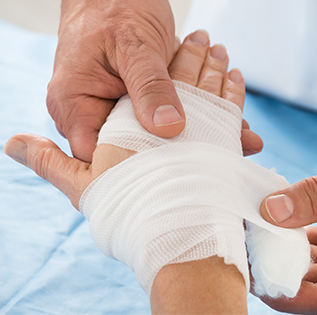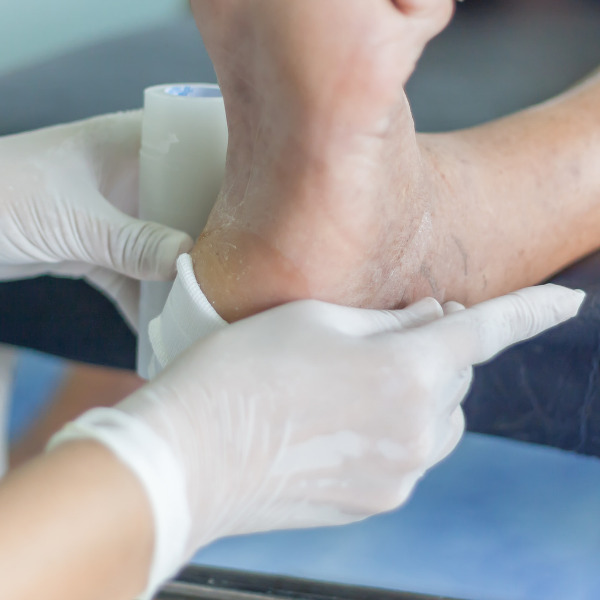Wounds are injuries that occur when skin is broken or punctured. Scratches, scrapes, cuts, and lacerations all count as wounds. This type of damage to the skin almost always happens because of an accident or injury. However, in some cases, they also result from medical procedures. The severity of the wound may depend on how deeply the tissue or nerves may have been damaged and whether the wound area has suffered any contamination. Some of the common types of wounds include:
- Cuts
- Scrapes
- Scratches
- Lacerations
- Punctures
- Abrasions
Wounds can be caused by any sharp, blunt, or projectile object such as a knife, shard of glass, nails, etc. Almost all the wounds fall into two categories:
Chronic or Acute
Chronic wounds take a relatively long time to heal, and they may cause some health complications in the process. Acute wounds heal faster and, typically without any major complications.
Open or Closed
Open wounds have exposed underlying skin tissue, so they are open to the outside environment (like penetrating wounds). Closed wounds occur without any exposure to the underlying organs/tissue, such as abrasions.
Wound Symptoms
The most common symptoms of wounds include:
- Pain
- Bleeding
- Swelling
If it’s a minor cut or scrape, wound treatment entails washing the wound first and then applying an antibiotic ointment and a dressing or Band-Aid. However, if you notice any of the following signs, you must see a doctor for wound treatment immediately:
- The wound doesn’t stop bleeding even with persistent elevation and pressure
- If it seems the wound requires stitches
- The wound was caused by significant trauma or force, and you have other injuries as well
- It the wound is caused by an animal or human bite
- If the wound is caused by a rusty object
- If you haven’t received a tetanus shot in the last 5 years (or you have never been immunized)
- If you notice any swelling, increased pain, redness, and pus
- Wound healing appears to be delayed

Wound Care at Exer
At Exer Urgent Care, we are fully equipped to provide medical care for almost any type of non-life-threatening wound. Our medical team will need to examine the wound first before they can create an effective wound care plan. While specific wound care will depend on the type, severity, and location of the wound, in general, our medical providers will begin the treatment by thoroughly cleaning the wound to ensure any foreign bodies are removed. This helps minimize infection risks and paves the way for faster healing.

Once the wound is cleaned, our care team will treat the injured site using a combination of medications, antibiotic creams, sutures, and bandages. Our medical professionals will give you instructions for follow-up care at home for safe healing. In severe cases, if the wound does not heal well or an infection develops, you should revisit our urgent care clinic for an immediate review. If the condition is not life-threatening, our wound care physician will provide the best possible treatment right away in house.
While topical wound care for fragile skin tears and puncture wounds is likely to be uncomplicated, advanced skin wound care and treatment for conditions such as venous leg ulcers, pressure ulcers, diabetic foot ulcers, surgical wounds, non-healing wounds, and deep tissue or blood vessels damage may require more specialized treatment. Some of the innovative wound management treatments include negative pressure wound therapy, hyperbaric oxygen therapy, and growth factor therapy.
When Should You Visit Exer Urgent Care for Wound Care?
The severity and type of the wound will determine if you need a physician, a wound care specialist, or a surgeon. We recommend walking into one of our Exer Urgent Care clinics for a more thorough diagnosis of your wound. In general, you should visit us for wound care as soon as possible if you are experiencing significant wound pain, the wound has dirt or a foreign body embedded in it, you are feeling numbness around the site of the wound, there are signs of infection (such as pus, redness, swelling, or fever), or wound has not healed fully within a few weeks of the injury.
For jagged-shaped wounds and any type of facial wounds also we recommend that you should visit your nearest Exer walk-in clinic as soon as possible. Moreover, if you notice that the wound seems to have gaping edges, involves considerable blood loss, or is deep enough to expose muscle, bone, or fatty tissue, it may be best to visit an ER for appropriate surgical treatment.
Getting seen by a physician or medical professional within 1-2 hours of your wound reduces the risk of infection and scarring. Depending on your injury or wound, sometimes our wound care team may suggest taking nutritional supplements for Vitamin D, zinc, and protein. Most people don’t know this, but these nutrients have a major impact on how fast the body heals. If you have a chronic wound, you may be referred to a nutritionist as well.
Is it Better to have Your Wound Covered for Faster Healing?
Moisture is necessary for a wound to regenerate tissue and heal properly. Therefore, having the wound covered for a certain time period is recommended while the wound is still not completely healed. It also helps prevent infection in the wound healing cells. With that said, beyond that time period, the wound should be uncovered to allow the tissue to breathe. Our team at Exer Urgent Care can guide you about how long you may need to keep your specific wound covered.
In the case of open wounds, the fastest healing occurs when the wound is closed and dressed in bandages or sutures or both. Once our care team has closed your wound, they may prescribe antibiotics to mitigate the risk of infection or delayed healing. If you are looking for a well-equipped wound care clinic in California, you should visit one of the conveniently located Exer Urgent Care clinics. We are happy to accept walk-in patients.
Do You Need Urgent Wound Care?
We recommend you seek urgent care at Exer for all types of non-life-threatening wounds, shallow facial cuts, minor bites, and if you need stitches. Before your visit, you may want to do basic first aid wound care for minor cuts. Simply clean the wound with mild soap and water, then apply an antibiotic ointment, and cover with a dressing/gauge. Apply even pressure with a clean cloth/bandage. If the bleeding doesn’t stop even after 10 minutes, visit Exer.
At Exer Urgent Care, we offer affordable and convenient wound care services for wounds that are not life-threatening. No appointments are necessary for you to visit us! If you or your child is injured, visit our nearest walk-in clinic to start the healing process as soon as possible. Our wound care team can also give you some tips to reduce the appearance of scars that result from wounds, injuries, and stitches.
At Exer Urgent Care, we offer affordable and convenient wound care services for wounds that are not life-threatening. No appointments are necessary for you to visit us! If you or your child is injured, visit our nearest walk-in clinic to start the healing process as soon as possible. Our wound care team can also give you some tips to reduce the appearance of scars that result from wounds, injuries, and stitches.
